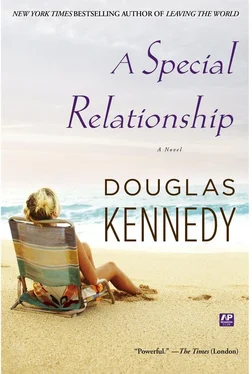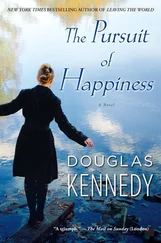I did call BUPA as soon as I finished speaking to Ellen. The 'customer service representative' on the other end of the line asked me for my name, my address and my policy number. Then, after a moment, she confirmed what I already suspected: 'I'm afraid your policy has been cancelled. You were insured under your husband's policy - which, in turn, is part of a group company policy. However, he left his job and the policy was cancelled. Sorry'.
I did some math. Even if I restricted myself to a session a week between now and the full hearing in six months' time, I would still end up paying £1680 for Ellen's therapeutic service - an impossible sum, given that I didn't have a job. So it looked like I would simply have to make do with my anti-depressants and my extended transatlantic phone calls with Sandy.
'You have to find a new lawyer', she said the night I discovered I had been dropped from our private health scheme. 'Especially as you're going to have to deal with the house thing very soon'.
'Maybe I should just accept his offer'.
'No way...'
'But it's a no-win situation, no matter what I do. Tony knows this too. And he's got that woman behind him - with all the money they need to break me. Which is what they're certainly trying to do. As much as I'd like to say climb-every-mountain stuff like, "They won't bring me down," the fact is they can, and they will'.
'Whatever you do, don't agree to anything until you get yourself another attorney'.
'I can't afford another attorney right now'.
'You're going to have to go back to work, aren't you?'
'I want to go back to work. I need to go back to work. Before I go completely crazy'.
I articulated the same sentiment to a Ms Jessica Law, the CAFCASS reporter, who visited me at home for what she described as a preliminary interview. She was around my age, wearing subdued clothes, wire-rimmed glasses, and a sensibly direct manner. From the moment I opened the door, I could see that she was sizing me up, trying to work me out, and see whether all the reports she had undoubtedly read about me tallied with how she herself perceived me. Her early enforced pleasantness - a tone of voice which said, 'Let's try to get through this uncomfortable business as reasonably as possible' - hinted that she was expecting a harridan, still in the throes of a major psychological rupture. I could also tell that she was taking in everything about my bearing, my manners, my dress sense (well-pressed jeans, a black turtleneck, black loafers), and my material circumstances. She noticed my collection of books and classical CDs, and the fact that I served her real cafetiére coffee.
She then quickly let it be known that this was business.
'Now I know this can't be the easiest of situations for you...' she said, sugaring her coffee.
'No, it isn't', I said, thinking: just about everyone I've met in the social services have used that expression' -this can't be easy for you'. Is that an acknowledgment of my so-called 'pain', or their way of informing me: but there's even more discomfort to come?
'I plan to see you two or three times in all before I submit my report. I would normally see you on the first occasion with your husband, but given the sensitivity of the situation, I decided against that in your case. I will see him separately. What I would like to point out is that, in no way should our conversations be considered as cross-examinations. You're not on trial here. My goal is simply to give the court an overall picture of your circumstances'.
You're not on trial here... it's just a little chat. How wonderfully English. I was, without question, on trial here - and we both knew it.
'I understand', I said.
'Very good', she said. She bit into a Stem Ginger biscuit, contemplated it for a moment before swallowing, then asked, 'Marks and Spencer?'
'That's right', I said.
'I thought so. Delicious. Now then... I note from your file that you moved to London just under a year ago. So I suppose a reasonable first question might be: how are you finding life in England?'
When I recounted this question to Sandy later that night, she said, 'You've got to be kidding me? She actually asked you that?'
'And they say Americans are deficient in the irony department'.
'Well, did you furnish her with the appropriate ironic answer?'
'Hardly. I was very polite, and moderately truthful - saying that it hadn't been the easiest of adjustments, but that I had also been ill for the past few months and therefore couldn't really judge the place from the standpoint of someone who wasn't yet a functioning part of it. Which is when she asked me if it was my intention to become "a functioning part of England" to which I said, "Absolutely" - reminding her that I had been a journalist before coming to England, and had also been a correspondent here until my high blood pressure bumped me out of my job'.
'I should be able to find work here', I said. 'Because there's so much journalistic work in London'.
'So, should you regain residence of your son', she asked, 'or should the court agree to shared residence, you would plan to raise him in England?'
'Yes', I said, 'that would be the plan - because he would then have access to both parents'.
'Smart answer', Sandy said. 'Did your interrogator approve?'
'I think so. Just as I also think she doesn't disapprove of me. Which is something of a start. Still, the critical thing now is to find work - and show that I can once again be a functioning member of society'.
'But do you think you're actually ready for work? I mean' -
'I know what you're about to say. And the answer is: I have no choice. I need the money, and I also need to show the powers-that-be that I can work'.
But finding a job proved to be a complex task. To begin with, my professional contacts in London were nominal - two or three newspaper editors whom I'd met during my short stint as correspondent here, and a CNN producer guy named Jason Farrelly, with whom I had become moderately friendly when he did a four-month stint in Cairo around two years ago. He had since been downgraded to the Business News ghetto in the London bureau. But he was the senior producer of CNN Business News Europe - which meant that making telephonic contact with him wasn't easy as all senior news producers in big bureaus make it a point to be too busy to return your calls. So after leaving five messages, I decided to try my luck with one of the newspaper editors I'd met a few months earlier. Her name was Isobel Walcott. She was the deputy features editor of the Daily Mail. I'd taken her out to lunch when I was working on a piece about the decline and fall of London manners, as she had written a jokey little book on the subject. I remembered her as someone who combined a cut-glass accent with a propensity for dropping the word 'fuck' into casual conversation; who drank about five glasses of Sauvignon Blanc too many, but who also told me towards the end of the lunch, 'If you ever have a feature idea that might work for the Mail, do give me a bell'.
Which is what I decided to do now. I even managed to dig out the business card she'd given me, and found her direct number. But when she answered and heard my name, she asked curtly, 'Have we met?'
'I was the Boston Post correspondent who took you out to lunch a couple of months ago, remember?'
Suddenly, her tone went from abrupt to dismissive.
'Oh, yes, right. Can't really talk now...'
'Well, could I call you later? I have an idea or two for a feature, and as you did say that if I ever wanted to write for the Mail.. '.
'I'm afraid we're rather top-heavy with features right now. But tell you what... email me the ideas and we'll see. All right? Must dash now. Bye'.
I did email her the two ideas, not expecting to hear from her.
I expected right.
Читать дальше












